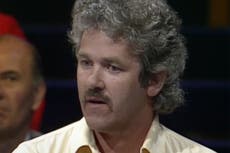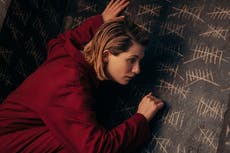The Pembrokeshire Murders review: Some cases are best left alone
Luke Evans stars in the latest ITV true crime series to be brought down by a weak script and a long list of cliches
You’ve seen The Pembrokeshire Murders (ITV) before, even if you haven’t. It’s a symposium of true crime tropes. They gather in a heap, like a dune at Barafundle Bay. There’s a picturesque but impoverished stretch of Britain’s coastline, in this case southwest Wales. There’s an honest detective with a difficult family life played by a star, in this case Steve Wilkins (local-ish Hollywood boy Luke Evans). There are awful crimes, in this case a series of murders, rapes and robberies during the 1980s. There is a prurient fascination with the killer, in this case John Cooper (Keith Allen), and almost zero empathy with his many victims.
It’s 2006, and DS Wilkins has just arrived back in Wales after a stint in London. He’s gained a new job, deputy head of CID for Dyfed-Powys Police, but lost a marriage, and must juggle his new responsibilities with being a father to Jack (Steffan Cennydd) and Amy (Mabli Jen Eustace). Soon he decides to reopen two unsolved double murders, from 1985 and 1989. The main suspect, John Cooper, is already in prison for other crimes, but advances in DNA-gathering mean the old crimes might now be pinned on him.
In one sense, ITV have built a brand with their true crime output over the past 20 years, in that you could pick almost any scene at random and know exactly which channel you were on. Compared to last year’s Des, however, which paid such attention to period detail that your clothes smelt of smoke afterwards, The Pembrokeshire Murders feels shaggy. Des coped with the lack of jeopardy about the killer’s identity by building around David Tennant’s gripping performance as Dennis Nilsen. Here they try to create a race-against-time-and-budget around forensic submissions. It’s unconvincing.
The most egregious scene in the first episode comes about halfway through, when Wilkins and his team are assigned a dilapidated office to conduct their new investigation, codenamed Operation Ottawa. It’s the start of The Wire, remade by an adult education college. Evans even looks like Dominic West, and is obliged to drink out of a hip-flask while surveying his new premises. If you’re going to rip off the greatest police drama, spend more than five minutes on the dialogue.
“The first rule of Operation Ottawa is – you do not talk about Operation Ottawa,” says DI Ella Richards (Alexandria Riley). “The second rule of Operation Ottawa is…”
“You do not talk about Operation Ottawa,” finishes DS Gareth Rees (Charles Dale).
“It’s from Fight Club, a film,” says DC Nigel Rowe (Kyle Lima), evidently the brains of the outfit.
“Thank you, Barry Norman,” says DI Lynne Harries (Steven Meo).
Oof, goes the viewer.
Evans can’t do much with a script that was based on a book co-written by Wilkins and the ITV Wales journalist Jonathan Hill (David Flynn), and casts both men as the heroes of the hour. There are few things more suspicious on screen than heroic hacks. A glimmer of light comes from Allen, who applies his usual shifty-eyed charisma to John Cooper. Except in this instance, you wonder if it’s appropriate to be charmed into rooting for the serial-killer rapist. It’s a sign that in TV, if not in policing, some cold cases are best left alone.
Join our commenting forum
Join thought-provoking conversations, follow other Independent readers and see their replies
Comments


Bookmark popover
Removed from bookmarks